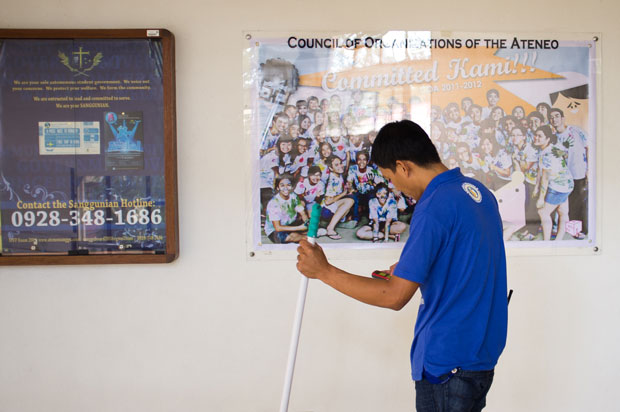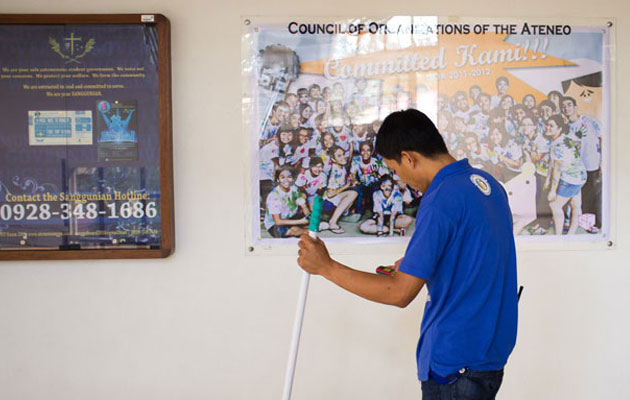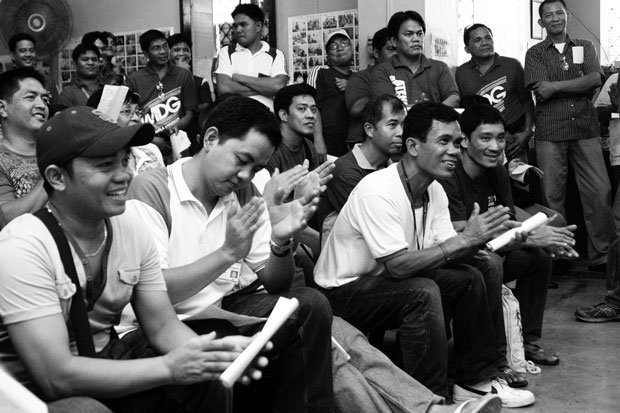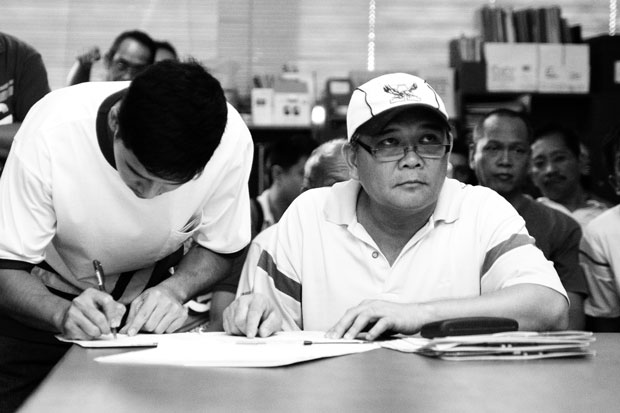
Photo by Joseph S. Angan
Six months ago, the development was considered groundbreaking. For a student political party to establish a partnership with the worker’s union was a project that, though filled to the brim with the potential of shifting a prevailing paradigm in labor dynamics, was quite the unlikely possibility on campus–until young socialists came into the picture.
Not long after the meeting between the Christian Union for Socialist and Democratic Advancement (Crusada) and the Ateneo de Manila University Employees’ and Workers’ Union, a memorandum of agreement was signed, formalizing the partnership between the two groups. The time that has passed since then has seen the heightening of cooperative efforts between the two groups.
The purpose of the alliance was to address the concerns of the workers which would have otherwise been left unfulfilled or ignored had it been merely left for the consideration of the Sanggunian or the university administration. The partnership’s goals were diverse but focused, aiming to nurture relations between students and workers, ensure the welfare of the laborers, and secure higher wages for them.
In the past half-year, however, activity has been quiet—so dormant that, although minor labor issues like holiday pay have come up, no word of development from the partnership has been of particular note. Whatever progress has been made and whatever difficulties have been faced have not yet been explored thoroughly until recently.
Difficulties and progress
Crusada has been proceeding with the partnership at a cautious pace, with members well aware that a commitment this significant would have to be handled delicately.
Bian Villanueva, secretary-general of Crusada, says that the main challenge is largely within the party. “We’re trying to settle informing the party first to make sure that we are able to convey the message much more clearly.”
The past six months have consisted mostly of solidifying the terms agreed upon when the alliance was formed. One of these proposals was to provide union workers with a 100% tuition subsidy for the workers’ children, the negotiations of which are slowly coming to fruition.
Villanueva says that the party had to go through a data gathering process regarding the income of workers and the tuition of students in order to figure out how to bring about the best results, given the numbers. The party had consulted with external sources in an attempt to be cooperative with both the union and the administration.
Union leader Tobias Tano, who also heads the All Filipino Workers Confederation, has so far met no difficulties with the partnership, something he attributes to consistent and clear communication with the party.
“Kung kailangan nila ng suporta ng union members, eh susulat sila sa amin ng request na samahan sila, na tulungan sila. Ganu’n din sa amin,” he says. “Kung, halimbawa, may mga legal problems kami, at kailangan namin sila, eh ‘yun din.”
“Ang pokus ng union ay: ang lahat ng mga union members at mga employado [mabigyan ng scholarships]. At ang aming proposal na ganu’n, tutulong ang [Crusada] na ipaabot sa inyo, ang mga estudyante.”
Situation in the union
Activity in the union has been less tempestuous as of late, considering how the year 2009 saw the real threat of a strike by the members. At that time, the negotiations with the administration did not align with the demands of the laborers, resulting in a “deadlock.”
The GUIDON’s past issues have also touched on the union’s inconsistencies, including on how problematic the dynamics were for the union internally, with contradicting ideas resulting in members resigning from previously held positions.
Today, this kind of tension seems to have died down. Only minor issues like the holiday pay have come up, but not without being resolved. Negotiations have proven to be more fruitful.
Tano has managed to keep the union’s recent relationship with the administration tranquil, with most of the communication manifesting through letters being sent back and forth with the hopes of mutual agreement.
“Most of the issues I think the union still faces up to now [are] still minimal compared to the time when they almost went on strike,” says Villanueva.
Sanggunian Vice President Gio Alejo believes that the workers of the Ateneo are faring relatively well, given the certain privileges they receive for working in the school.
“There [has] been no major issue that has been raised regarding our workers since half a year ago, except for the change in security agency,” Alejo says, pertaining to the controversial change in security agency from Leopard to Megaforce, an issue which Crusada had also been heavily involved in.
He continues, “[Ateneo workers] have benefits, and the regular employees are rewarded for their loyalty to the school.”
“Not all of them are minimum wage [earners], compared to other institutions. Our workers are well taken care of,” says Villanueva.
Student awareness
Despite the relatively better standards of work in the Ateneo compared to most other environments in the country, the union still finds certain facts lamentable. For example, it has been much to the union members’ chagrin—as they have expressed to Crusada—that most students are not aware of the laws and rights pertaining to labor.
“In terms of rapport-building, in terms of community-building, I think the Ateneo has that. But then in terms of solidarity, in terms of understanding where the workers are coming from—the context of labor unionism—that’s what’s lacking,” Villanueva explains.
He goes on to emphasize that for the relations between students and workers to thrive, there is a necessity for an authentic understanding of the dynamics of labor. “I think awareness is the key to understanding the issues—making sure that the students understand where the workers are coming from. That’s where dialogue begins.”
“Different ideology”
The Sanggunian had previously been criticized for doing close to nothing in addressing the concerns of the labor union. Several justifications have been cited, a notable one being the difference in ideology.
“We are primarily focused on providing services and initiatives that will respond to the needs and the formation of the students,” says Alejo, on how the Sanggunian opts to engage itself in holistic activities more along the lines of community-building, with a focus on the body’s “tri-fold core competency of representation, student movement integration, and provision of basic services.”
Nevertheless, Alejo says, “In the end, the Sanggunian is open to discussions with our workers as well if they have any concerns, especially if our students are directly involved in these.”
Meanhile, Villanueva affirms that issues of labor and unionism are “close to the party’s heart.”
“We still find some of the [student government’s] actions lacking, which isn’t really a problem—it’s not really their fault because that’s not how their ideology leans,” he says.
Tano, however, says that the most pressing issues currently facing the union need not be run through negotiations with the student government.
“Ang isyu naman ho ay problema sa trabaho, rules and regulations at saka yung minsan, mga abuses sa part ng management, mga abuses din sa part ng union,” he explains. “‘Yun ‘yung nire-resolve na ‘di naman kailangang idaan sa Sanggunian.”
Administrative concerns
When asked if the union has been encountering difficulties with the administration, Tano responds with a sanguine “Meron… pero naresolba,” referring to the issue of holiday pay.
He also feels that there are inconsistencies among supervisors and the administration, which is a cause for concern, given that the union and the administration follow the same set of rules.
“If we look at the matter, compliance really is needed,” Tano says in Filipino. He elaborates on his concerns by using the issue of laborer’s wages as an example.
“It should be equal—equal distribution, equal amount of benefits for all workers. Just because you are ranked higher should not necessarily mean that you take more,” he says. “That’s the issue that leads to a deadlock sometimes.”
National perspective
The benefits that the union members receive from working in the Ateneo are hardly available to most other workers in the country. In fact, other institutions are unable to provide even the most basic of rights to its employees, with employers being guilty of poor management and ill—and sometimes, even inhumane—treatment of subordinates. The recent strikes of the Philippine Airlines Employees’ Association come to mind, for example, and also the longstanding struggles of farm workers in Hacienda Luisita.
The abuse of human capital is widespread, seeing how the dominant contemporary financial and economic paradigms seem to have little regard for ethics.
It seems, then, that the first step towards challenging these dominant systems is to acquire a genuine awareness of the plight of those of different socioeconomic backgrounds.
“It’s going to be important for students to know that [people] are not always going to be in a privileged position,” Villanueva says. “There are other people out there who are not.”









